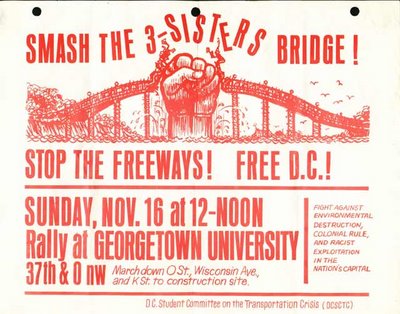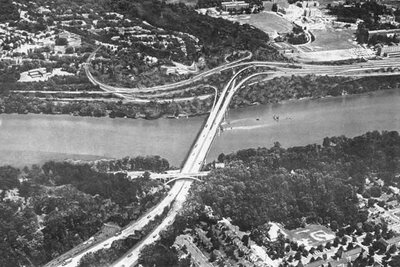According to Gilbert Hahn Jr.: The Notebook of an Amateur Politician (and how he began the D.C. subway)

http://books.google.com/books?id=6mZWVFsxFg8C&pg=PA4&lpg=PA4&dq=Reginald+Booker+freeway&source=bl&ots=KVpr2SHlgH&sig=5TWeeQ27IZPFP0gy3Hnu6p2lbjI&hl=en&ei=JZbfStC_NIrIlAehvOBK&sa=X&oi=book_result&ct=result&resnum=5&ved=0CBoQ6AEwBA#v=onepage&q=Reginald%20Booker%20freeway&f=falseThis curiously ignores the concept of urban freeways below ground in tunnels, versus say that of surface and elevated RR berms that quad sect Washington, D.C.
“…Arrayed against the freeway lobby was a fiercely vocal, but not very impressive group called the Emergency Committee on the Transportation Crisis. This was a group headed by an otherwise very nice young man named Reginald Booker and included Sammy Abbott, former Communist candidate for the House of Representatives from Buffalo and later the mayor of Takoma Park. It also included Julius Hobson and, as one of the chorus, Marion Barry. I held some freeway and Three Sisters Bridge hearings, which immediately broke up into several famous riots (but more of that latter.)
The committee [ECTC] was funded by solid citizens of Georgetown, like attorney Ed Burling. Their interest in the matter was to prevent the Three Sisters Bridge – or any highway – through Georgetown, and so they funded Reginald Booker and all of his conferees very lavishly. When a hearing on the Three Sisters Bridge broke up yet in another riot, I had Ed Burling and his fellow Georgetowners to thank for paying Booker and Company to riot. Among other things, I was hit with a flying ashtray.
Why was I so adamant? I don’t give myself any particular merit badges for agreeing with the argument that freeways would ruin the city and Balkanize its different parts by putting up a “Chinese Wall” through the middle of a neighborhood. It’s just that I thought that it was a good thing not to have the freeways and the Three Sisters Bridge, and a better thing if I could manage to get the subway system funded instead.
Perhaps this curious RR-freeway double standard has something to do with this significant backer being a RR industry attorney?
The name "Burling" within the name of the law firm Covington & Burling refers to its co-founder, Edward B. Burling. According to the firm's web site:
"Judge J. Harry Covington and Edward B. Burling opened the doors of Covington & Burling in Washington, DC, on January 1, 1919. "Edward Burling, who would die in 1966, had a son, Edward Burling Jr. According to his 2002 obituary:
http://www.cov.com/washington/
"The founders of Covington & Burling LLP foresaw the pervasive effects of the forthcoming era of federal legislation, regulation, and taxation. In 1919, they sought to create a firm in the nation's capital that could advise and represent corporations located anywhere in the nation or the world on a wide range of legal issues. Today our Washington office has over 300 lawyers representing clients according to the highest standards and fulfilling the firm's strong commitment to public service."
(excerpt)http://www.nytimes.com/2002/12/03/us/edward-burling-jr-94-senior-partner-at-a-top-law-firm.html
Edward Burling Jr. was born in Chicago on Feb. 5, 1908. His wife, Frida Frazer Winslow, said he was not given a middle name, but was called junior to avoid confusion with his father.
He graduated from Milton Academy in 1925, Yale University in 1929 and Harvard Law School in 1932. He then volunteered to work for the presidential administration of Franklin D. Roosevelt. Thomas G. Corcoran, a presidential aide and later a powerful Washington lawyer, assigned him to work for the legal staff of the Reconstruction Finance Corporation, a New Deal agency. He next worked on the staff of the Treasury Department.
In 1935, he joined the law firm that his father had founded with Mr. Covington, and, except for his war service, in the Army Air Force in World War II, stayed there until his retirement at 65.
Two of his principal clients were the metal-cutting tool industry and the National Trust for Historic Preservation. He acted as financial adviser to corporate clients and represented their interests before regulatory agencies, particularly the Federal Power Commission, now the Federal Energy Regulatory Commission.
Mr. Burling was known for extensive philanthropy, and among the recipients were child adoption agencies in Washington.
The law firm Covington & Burling has long been allied with the private organization, the "Committee of 100 on the Federal City", which along with U.S. National Capital Planning Commission, was founded by Frederic Adrian Delano, uncle to 32nd U.S. President Franklin Delano Roosevelt, and brother in law to Burling via marriage to a pair of sisters.

since 1981
the Covington & Burling building
James Harry Covington (August 15, 1863 – May 14, 1939) was an American jurist and politician. He represented the Maryland's 1st congressional district in the United States House of Representatives from 1909 to 1914, and served as chief justice of the Supreme Court of the District of Columbia from 1914 to 1918.
Covington was born in Easton, Maryland, and attended the Maryland Military Academy at Oxford. He entered the law department of the University of Pennsylvania at Philadelphia in 1891, attending at the same time special lectures in history, literature, and economics, and graduated in 1894.
Soon thereafter, Covington began to practice of law in Easton. He was an unsuccessful Democratic nominee for the Maryland State Senate in 1901, and served as State’s attorney for Talbot County, Maryland, from 1903 to 1908. He was elected as a Democrat to Congress in 1908 and served the 1st Congressional district of Maryland from March 4, 1909 until his resignation on September 30, 1914, to accept the position of chief justice of the Supreme Court of the District of Columbia.
Covington served as chief justice of that court from October 1, 1914, to June 1, 1918, when he resigned to practice law in Washington, D.C.. He was a professor of law at Georgetown University from 1914 to 1919, and was appointed by President Woodrow Wilson as a member of the United States Railroad Commission in January 1918. He and Edward B. Burling established the law firm of Covington & Burling on January 1, 1919. Covington died in Washington, D.C., and is interred in Spring Hill Cemetery of Easton.
Covington served as Worthy Grand Master on the Supreme Executive Committee of the Kappa Sigma Fraternity from 1892–1894.
Kappa Sigma Official SiteKappa Sigmas are taught to live their lives by the Star and Crescent, which are the symbols of the Fraternity that make up the official badge:
The Star and Crescent shall not be worn by every man, but only by him who is worthy to wear it. He must be a gentleman... a man of honor and courage... a man of zeal, yet humble... an intelligent man...a man of truth... one who tempers action with wisdom and, above all else, one who walks in the light of God.[9]
The Star and Crescent is also used as part of the guidlines behind Kappa Sigma's strict no-tolerance anti-hazing policy. The Fraternity takes all allegations of hazing very seriously and routinely pulls charters from guilty chapters which can be as old as 130 years.
They also follow the four cornerstones of the Fraternity: Fellowship, Leadership, Scholarship, and Service.
http://en.wikipedia.org/wiki/Kappa_Sigma
Frederic A. Delano's 'Family'















3 comments:
If you can really prove that those people were paid to riot, I would think you and all the other victims would have a slam-dunk lawsuit, and maybe even a RICO case. I don't think anyone except the labor unions considers rioting to be covered by freedom of expression, and it's certainly not peaceable assembly.
All I know about this allegation is that its is what I found in that book while doing an intensified series of Google word searches following Ruth Abbott's death last week.
What I do know is that law firm is deeply involved with a lot of topics that I blog about (go to my profile and see the tag "Covington & Burling" in each of my blogs), and that its co-founder Ed Burling was a railroad industry attorney. A studio of Ed Burling and his involvement with the RR industry would be an excellent avenue of research IMHO.
Best Regards
Douglas A. Willinger
From GGW comments:
Anyone interested in these issues--or uninterested in them for this matter--should check out Douglas Willinger's excellent cri du cerveau:
http://wwwtripwithinthebeltway.blogspot.com/2009/10/ectc-paid-to-riot-via-covington-burling.html
Hugely entertaining.
by oboe on Dec 19, 2011 11:25 am
http://greatergreaterwashington.org/post/13076/the-outer-beltway-the-bad-idea-that-wont-go-away/
Post a Comment